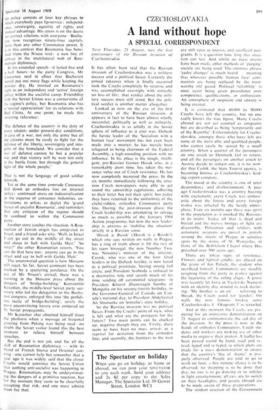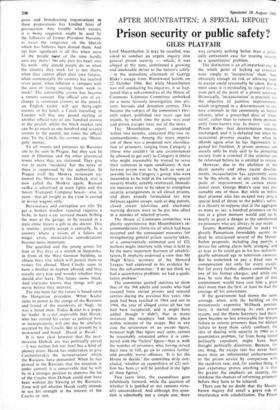CZECHOSLOVAKIA
A land without hope
A SPECIAL CORRESPONDENT
Next Thursday, 21 August. sees the first anniversary of the Russian invasion of Czechoslovakia.
It has often been said that the Russian invasion of Czechoslovakia was a military success and a political fiasco. Certainly the armed takeover when it finally occurred took the Czechs completely by surprise and was accomplished overnight with virtually no loss of life: that verdict about the mili- tary success must still stand. But the poli- tical verdict is another matter altogether.
Looked at now on the eve of the first anniversary of the Russian invasion, it appears in fact to have been almost wholly successful, politically as well as militarily. Czechoslovakia is as solidly in the Soviet sphere of influence as it ever was. Dubcek the heroic leader of the 'Socialism with a human face' movement has not even been made into a martyr; he has merely been relegated to being chairman of the Federal Assembly, a high-sounding position with no influence. In his place is the tough, intelli- gent, pro-Russian Gustav Husak who, in a remarkably short time, has taken the nui- sance value out of Czech resistance. He has now completely mastered the press. In the six months immediately following the inva- sion Czech newspapers were able to get round the censorship regulations, adhering to their letter but not their spirit; but today they have returned to the uniformity of the cliché-ridden, orthodox Communist party line. During the post-invasion phase the Czech leadership was attempting to salvage as much as possible of the January 1968 Action programme, but now the new leader- ship is anxious to `stabilise the situation' strictly in a Russian sense.
'Husak je Rusak' ('Husak is a Russkil which one sees written on walls in Prague, has a ring of truth about it. Of the rest of his team Strougal, the new Number Two, was Novotny's minister of the interior; Cernik, who was one of the four feted leaders in the Dubcek heyday, is now hated as a political prostitute, having swung full circle; and President Svoboda is reduced to a decorative role and spends much of his time sending off ceremonial telegrams-- to President Khural Zhamsragin Sambu of Mongolia on his seventy-fourth birthday. to the Governor-General of Canada on Can- ada's national day, to President Abdeirashid All Shumarke on Somalia's state holiday.
So the Russian invasion was no political fiasco. From the Czechs' point of view, what is left and what are the prospects for the future? Two main points can be chalked up, negative though they are. Firstly, there seem to have been no mass arrests as a reprisal for deviation from the orthodox line; and secondly, the frontiers to the west
are still open to tourists and unofficial emi- grants. It is a question how long this situa- tion can last. And whilst no mass arrests have been made, other methods of 'purging' society are being used. The ominous phrase `cadre changes' is much heard -- meaning that wherever possible 'human face' com- munists are being replaced by the trust- worthy old guard. Political 'reliability' is once again being given precedence over competence. qualifications, or enthusiasm. An atmosphere of suspicion and anxiety is being created.
It is estimated that 40.000 to 50,000 Czechs have left the country, but no one really knows the true figure. Many Czechs abroad are not yet counted as emigrants but are described as being 'temporarily out of the Republic'. Unfortunately for Czecho- slovakia, amongst those who have left are some of the most able and qualified people, who cannot easily he spared by a small country. When a quarter of the passengers on one coach to Denmark fail to return. and all the passengers on another coach to Austria decide to remain out, it is no won- der that Cedok. the State Tourist agency, is becoming known as Czechoslovakia's lead- ing export company.
The mood in the country is one of utter despondency and disillusionment. A year ago Czechoslovakia was a country buzzing with excitement; every Czech was enthusi- astic about the future and every foreign visitor was infected by the heady atmos- phere. Even six months ago there was spirit in the population as it mocked the Russians in its midst. Today all that is dead and buried and the merest twinges of light are discernible. Policeman and soldiers with automatic weapons arc paired in patrols around the streets of Prague in sensitive spots by the statue of St. Wenceslas, in front of the Bethlehem Chapel where Hus preached over 5(X) years ago.
There are token signs of resistance. Flowers and lighted candles are placed on the grave of Jan Palach, the student who sacrificed himself. Communists are steadily resigning from the party in protest against the hypocrisy of the ruling clique. A goose was recently let loose in Vaclayske Namesti with an identity disc around its neck declar- ing. 'My brother is an ox' - - referring to Husak. the Czech word for 'gander'. On walls the now famous hockey score 'Czechoslovakia 4 -Okupanti 3' is scrawled.
And at this moment the Czechs arc pre- paring for an impressive demonstration on 21 August to commemorate the sad day of the invasion. As the press is now in the hands of orthodox Communists. Czech stu- dents and workers are making use of other media to organise their protest. A leaflet has been passed round by hand, read and re- read. typed and re-typed, in which plans are made for a mass demonstration to ensure that the country's 'day of shame', is pro- perly observed. People are told to go to work on foot; a five minute silence is to he observed; no shopping is to he done that day; no one is to go dancing or to indulge in light entertainment; all cars are to switch on their headlights; and people abroad are to be made aware of these preparations.
The strident reaction of the Government
press and broadcasting organisations to these preparations has kindled feiirs of provocation. Any trouble which ensues, it is being suggested, might be used by the followers of former President Novotny to exact the vengeance on the liberals which has hitherto been denied them. And yet how significant is all this when most of the people roost of the time hardly care any more? No one puts his heart into his work--why should people do so when the country they work for is not theirs, when they cannot affect their own-futures, when economically the country has reached crisis point, when inflation is rampant with the cost of living soaring from week to week? The convertible crown has become a remote concept. The official rate of ex- change is seventeen crowns to the pound; an English visitor will get thirty-eight crowns in his hotel; a Czech travelling to London will buy one pound sterling at another official rate of one hundred crowns to the pound; whilst the black market rate can be as much as one hundred and seventy crowns to the pound, ten times the official rate. To the Czech, his crowns are 'Mono- poly' money.
To all intents and purposes no Russians are to be seen in Prague, but they can be seen in Olomouc and the other provincial towns where they are stationed. They give rise to many 'incidents' but the news of these is suppressed by the authorities. In Prague itself the Moskva restaurant (re- named the Morava in the Dubcek era) is now called the Moskva again; Russian vodka is advertised in neon lights and the Soviet Transport Company boasts—also in neon—that all freight to the USSR is carried in Soviet wagons only.
Bureaucracy and corruption are rife. To get a broken window repaired requires a bribe, to have a car serviced means bribing the man at the garage, to be treated in a state clinic means a gift to the doctor. This is routine: people accept it cynically. In a country where a vision of a future no longer exists, materialistic considerations become more important.
The qualified and the young queue for four or five days at a stretch in Stepanska, in front of the West German building, to obtain their visa which will permit them to restart life abroad. Most Czechs seem to have a brother or nephew abroad, and they usually envy him and wonder whether they should also leave. The future seems bleak. And everyone knows that things will get worse before they improve.
The one hope for the future is based upon the Hungarian precedent. When Kadar came to power as the stooge of the Russians and friend of the murderers of Nagy, he was a hated man. Today Kadar is a popu- lar leader. It is not impossible that Husak, who has started his career as political boss so inauspiciously, will one day be similarly accepted by the Czechs. But at present he is mistrusted and hated: 'Husak je It is now clear however that the post- invasion Dubcek era was politically unreal —it was neither fish nor fowl but a kind of phoney truce. Husak has undertaken to give Czechoslovakia the `normalisation' which the Russians have demanded. When he has proved to the Russians that the situation is under control, it is conceivable that he will be in a stronger position to improve the lot of the Czechs than Dubcek could ever have been without the blessing of the Russians. Time will tell whether Husak really intends to use his strength in the interest of the Czechs or not.



































 Previous page
Previous page